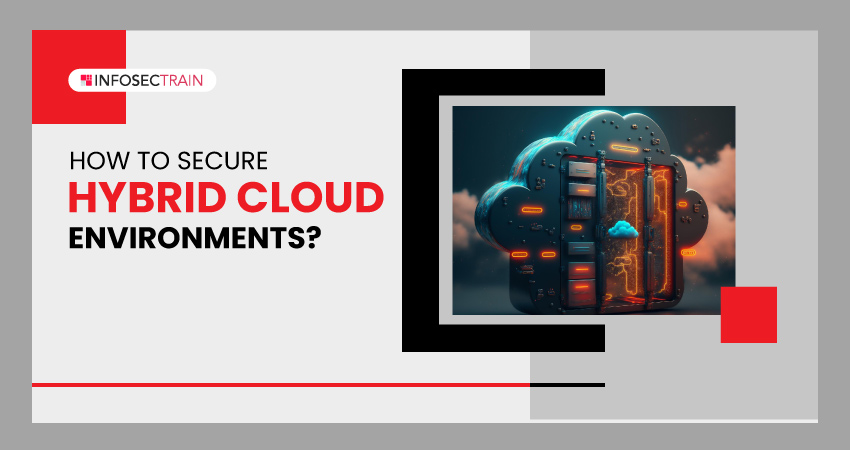How to Secure Hybrid Cloud Environments?
In today’s digital age, businesses are rapidly adopting hybrid cloud environments to leverage the benefits of both on-premises and cloud infrastructure. This approach offers the flexibility of data centers with the convenience of the public cloud, making it a better option for organizations seeking to balance performance, scalability, and cost-efficiency. However, ensuring the security of a hybrid cloud environment introduces new challenges that demand best practices and proactive strategies.

Table of Contents
What is a Hybrid Cloud?
What is Hybrid Cloud Security?
Managing Hybrid Cloud Security
Benefits of Hybrid-Cloud
Hybrid Cloud Security Challenges
What is a Hybrid Cloud?
A hybrid cloud integrates public cloud services with either private cloud resources or on-site infrastructure. In a hybrid cloud setup, data and applications can move seamlessly between the private and public cloud as needed, allowing organizations greater flexibility and more deployment options.
What is Hybrid Cloud Security?
Hybrid cloud security protects data and systems in an environment combining public cloud resources and on-premises infrastructure. Organizations can customize their hybrid cloud setups to meet their unique requirements, but this flexibility also brings the responsibility of implementing robust security measures.
Managing Hybrid Cloud Security
Securing a hybrid cloud environment is a shared responsibility. While cloud service providers handle the security of the underlying infrastructure, organizations must ensure data protection, access control, encryption, and configuration management. This applies to public cloud networks and on-premises data centers. Effective hybrid cloud security management is essential to safeguard an organization’s digital assets.
Benefits of Hybrid-Cloud
- Flexibility: Organizations can retain critical workloads on on-site or traditional servers while moving applications, emails, and Customer Relationship Management (CRM) systems into the cloud.
- Scalability: Hybrid clouds can be customized to an organization’s needs without incurring the costs of scaling up an on-premises infrastructure.
- Customizability: Organizations can tailor cloud tools and technologies to meet specific requirements, ensuring their hybrid cloud setup aligns with their business needs.
- Security: Advanced security solutions like Identity and Access Management (IAM), encryption, threat intelligence, and microsegmentation can be implemented to protect hybrid-cloud environments from modern threats, such as ransomware.
Hybrid Cloud Security Challenges
Hybrid-cloud security introduces unique challenges, including the following:
- Misconfiguration: Misconfigurations are common in hybrid clouds due to their complex nature. Security settings, access controls, and data encryption must be configured appropriately to prevent breaches. Employing automated security checks can help identify and rectify misconfigurations in real time.
- Identity and Access Management: Managing user identities and access control across on-premises and multiple cloud providers can be challenging. Effective role-based access control (RBAC) and identity federation are essential for maintaining security.
- Data Encryption: Ensuring data is encrypted both in transit and at rest across hybrid cloud environments is critical. Key management and encryption policies need to be consistent and tightly controlled.
- Cloud Provider Security: Trusting the security practices of various cloud providers is a concern. Organizations need to assess their chosen providers’ security measures and understand shared responsibility models.
- Hybrid-Specific Threats: Hybrid environments may introduce new attack vectors. For example, vulnerabilities or misconfigurations in the connection between on-premises and cloud resources could be exploited.
- Insider Threats: Whether malicious or negligent, insider threats can pose a significant security risk in a hybrid environment where data and systems are spread across various locations.
Hybrid Cloud Security Best Practices
Regardless of the specific hybrid cloud setup, there are several best practices for securing these environments:
- Implement the Principle of Least Privilege: Limit access to specific portions of the system to only those who need it.
- Secure Endpoints: Endpoint security is crucial, even in cloud-based systems. Employ comprehensive security solutions, provide user education, and focus on browser exploit protection and application whitelisting.
- Isolate Critical Infrastructure: Limit access to essential data to reduce the risk of attacks. Fewer people with access means better security.
- Encrypt Data: Encrypt data in transit and at rest. Data encryption is a fundamental security measure in a hybrid cloud environment.
- Backup Critical Data: Have a backup plan to prepare for emergencies, such as power outages or disruptions in data centers.
- Create a Business Continuity and Disaster Recovery Plan: Be prepared for emergencies, such as power outages or disruptions in data centers, by having a backup plan in place.
CCSP with InfosecTrain
Securing hybrid cloud environments involves ensuring visibility, strong Identity and Access Management (IAM), data encryption, network security, compliance, incident response, cloud-specific security tools, employee training, patch management, and backup plans. By implementing comprehensive security measures, adhering to the principle of least privilege, and embracing automation, businesses can harness the full potential of their hybrid cloud infrastructure while safeguarding their valuable data and digital assets. Check out InfosecTrain’s CCSP certification training course for your learning. This training course validates your expertise in hybrid cloud security and boosts your career prospects.

TRAINING CALENDAR of Upcoming Batches For CCSP
| Start Date | End Date | Start - End Time | Batch Type | Training Mode | Batch Status | |
|---|---|---|---|---|---|---|
| 05-Apr-2025 | 25-May-2025 | 09:00 - 13:00 IST | Weekend | Online | [ Open ] | |
| 24-May-2025 | 06-Jul-2025 | 19:00 - 23:00 IST | Weekend | Online | [ Open ] | |
| 21-Jun-2025 | 03-Aug-2025 | 09:00 - 13:00 IST | Weekend | Online | [ Open ] |






 1800-843-7890 (India)
1800-843-7890 (India)